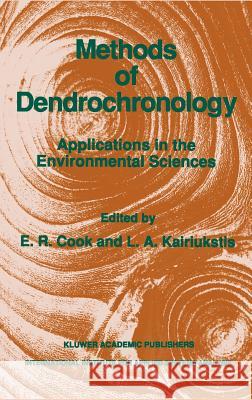Methods of Dendrochronology: Applications in the Environmental Sciences » książka
Methods of Dendrochronology: Applications in the Environmental Sciences
ISBN-13: 9780792305866 / Angielski / Twarda / 1990 / 394 str.
This book is a review and description of the state-of-the-art methods of tree-ring analy is with specific emphasis on applications in the environmental sciences. Traditionally, methods of tree-ring analysis, or more properly in this case methods 0/ dendrochronology, were developed and used for dating archaeological and historical structures and for reconstructing past climates. The classic book Tree Rings and Climate, by H.C. Fritts, published in 1976, provided a superb introduction to the science and an in-depth description of techniques useful for extracting climatic information from tree rings. This book, which was published by Academic Press, is sadly out of print and, even though only 12 years old, lim ited in its methods and applications. This is owing to the extremely rapid development of the science since the 1970s. Only recently have tree rings as environmental sensors been fully recog nized as a valuable tool in detecting environmental change. For example, tree ring measurements have been critically important in studies of forest decline in Europe and North America. There are also attempts to use tree-ring analysis for ecological prognosis to solve large-scale regional problems including the sustain ability of water supplies, prediction of agricultural crops, and adoption of silvi cultural measures in response to ecological changes. More speculatively, dendro chronological methods are also used for dating and evaluating some astrophysical phenomena and for indicating possible increase in the biospheric carrying capac ity due to increased atmospheric carbon dioxide."











